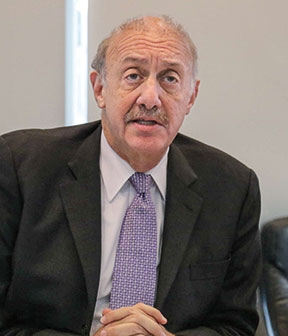Dangerous Currents: Samuel Issacharoff’s new book charts how populist movements threaten democracies around the world

Populism movements that pit ordinary people against established elites are sabotaging political institutions and undermining democracies around the globe, Samuel Issacharoff argues in his new book, Democracy Unmoored: Populism and the Corruption of Popular Sovereignty. Issacharoff, the Bonnie and Richard Reiss Professor of Constitutional Law, has written extensively on law and democracy, including a previous book, Fragile Democracies: Contested Power in the Era of Constitutional Courts, that examined how constitutional courts can counter authoritarianism.
Democracy requires two critical features, Issacharoff asserts: first, a commitment to “repeat play,” the acknowledgement that there will be future elections in which power can shift; and second, institutional constraints so that the majority can prevail, but not too much. Populist movements attack these fixtures of governance, which are vital to democracy’s survival, he writes.
In this interview, Issacharoff discusses the rise of populism globally, how to protect political institutions, and what he sees as “glimmers of hope” amid dire threats to democracy.
Your book details the ways in which populist insurgencies have arisen in both rich democracies and in less affluent democracies, such as Poland and India. How are these insurgencies similar and different? What surprised you the most?
The big difference between poor and wealthier countries is that the stable democracies in the more economically advanced countries had delivered a level of material prosperity to their working class citizens, to the middle classes of those countries. That created a great deal of buy-in to the general democratic ascendancy of the postwar period in Europe.
The economic shocks of globalization and the 2008 financial collapse shook that up. In my book, I locate in the economic uncertainty a great deal of the impetus toward the populist upsurge.
In poorer countries, you don’t have the same economic stabilization story, but you have a similar kind of fragmentation of political leadership and the established political order.
The manifestations [of populism in poorer and wealthier countries] are quite similar in that you get, for example, Prime Minister Narendra Modi in India, who in his rhetoric and in his style of governance looks quite similar to Viktor Orbán in Hungary, or to the electoral coalition that Giorgia Meloni put together in Italy, or to Jair Bolsonaro in Brazil.
The aim of the book is to show that there are sufficient similarities and sufficient time overlap between them—that you have to look for a slightly deeper root cause than just what’s going on at the national level politically.
In Fragile Democracies, you wrote that the best way to protect democracy is to solidify democratic governments and norms at a higher level of constitutional law and empower courts to enforce them. Eight years later, Democracy Unmoored asserts that the populists—in the US and abroad—figured out this strategy, and beat it. What happened?
The populists proved to be smart. Once they realized that the constitutional courts, which had been adopted after World War II in Germany and Italy, and then pretty much mirrored in the new democracies post-1989, were new institutions that could be called upon to resist moves to consolidate power, they reacted [by packing the court with loyalists]. It was not that the courts were guaranteed to always thwart authoritarianism, but there was always the prospect that they might be called upon to protect democratic norms. In particular, these courts have the power to protect the independence of election administration, civil service, and the various components of the government that were not under the direct say-so of the executive power.
At the end of Fragile Democracies, I said that I did not think that constitutional judicial review alone was a stable resolution for as long as there was no real political competition and no establishment of real political parties that would give protection to independent authorities like the constitutional courts.
And I think that my new book takes up from that and says, “OK, the democratic party system pretty much collapsed in Hungry. It collapsed in Poland, and in India. So what does it mean now that the courts cannot play this role?”
In the new book, instead of looking up to constitutional law and the constitutional courts, I look down to the ordinary administration of justice and the ordinary law and find some hope there.The independent corruption overseer in South Africa, together with the ordinary workings of the criminal investigation system, brought down President Jacob Zuma. In Brazil, the ordinary courts held out against Bolsonaro. In the United States, we have the investigations and now the first criminal prosecution of former President Trump. Times change and institutions evolve or die. That’s life.
What can we learn from studying populist movements?
We can learn a great deal about the precarious state of democracy, and how in the eyes of the public, democracy has always been viewed as being at risk of demagogues who can overtake it. This goes back to Athens, and it goes back to Rome. The main theme of this book is that the period of great democratic ascendancy—in the 19th and 20th centuries, particularly in the 20th century after the defeat of fascism and communism—was a period in which democracy flourished because of strong institutions between the government and the citizenry. Institutions like political parties, and other kinds of NGOs.
I think that studying populist movements reveals the importance of protecting those intermediary organizations, even in a weakened state, against being overwhelmed by a popular tide and a charismatic and not particularly democratically oriented leader.
The book concludes with an epilogue, “Glimmers of Hope.” Is there a way to maintain optimism while acknowledging the threat populism represents to democracy on a global scale?
I think that so far, at least, in most of these countries, the institutions have resisted being completely overtaken by the populist wave. In Brazil, the courts held out against him so that Bolsonaro was defeated. The election administration was handled cleanly, and there was a transfer of power. There are difficulties, of course, but it feels like normal politics.
In the United States, the courts did very well in 2020. The election administrators, even in the face of COVID, ran a very good election. The business community in places like Michigan said, “We are not going to crater the entire American institutional framework in favor of throwing one election one time.” So there are important pockets of institutional resistance that realize the scale of what would happen if the United States lost its institutional robustness.
And then I end up with the peculiar observation that the Russian invasion of Ukraine actually galvanized a sense that there is something deep at stake in democracy versus authoritarian rule. The widespread assault on civilians, the disregard for human life, the fact that we have trench warfare back in central Europe in the 21st century is a shocking, shocking development.
In many countries, the reaction to the Russian invasion has rekindled the sense that the democratic legacy is really important. It caused the split between Jarosław Kaczyńsk in Poland and Orbán in Hungary. It broke up the populist block—because do we really want to go back to a world commanded by something that looks like an effort to recreate the Soviet empire?
And so the glimmers of hope are that the institutions were weakened, but they did not break. They bent, but they did not break.
Posted on May 22, 2023. This interview has been edited and condensed.


